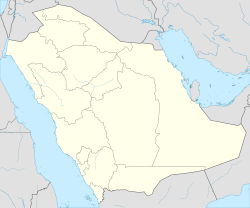Madrakah | |
|---|---|
Village | |
| Coordinates: 21°58′47″N39°59′15″E / 21.97972°N 39.98750°E | |
| Country | |
| Province | Makkah Province |
| Time zone | UTC+3 (EAT) |
| • Summer (DST) | UTC+3 (EAT) |
Madrakah is a village in Makkah Province, in western Saudi Arabia. [1] It is noted as being the first Saudi municipality to elect a woman, Salma bint Hizab al-Oteibi, to its respective Municipal council. [2]
